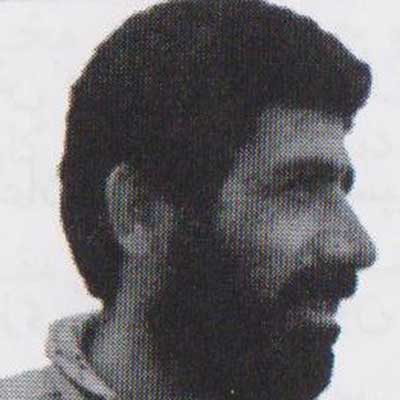Ahmadi, Abbas Ali
Masoumeh Abedini
309 بازدید
Abbas Ali Ahmadi (1940–1980) served as the deputy commander of the 285th Tank Battalion of the 81st Division of Kermanshah during the Iran-Iraq War.
Born in 1940 in the village of Satr, near Saqqez in Kermanshah province Ahmadi grew up in a farming family. After completing his primary education up to the sixth grade, he joined the military at the age of 20. Between 1961 and 1962, he underwent basic military training and earned the rank of Third Sergeant in the Armored Corps at the Non-Commissioned Officers Academy in Tehran. Afterwards, he was transferred to the 92nd Armored Division in Ahvaz.
In 1972, having obtained a diploma, Ahmadi gained admission to the Officers' Academy. Following basic military training in Shiraz, he was then assigned to the 16th Armored Division in Qazvin, where he served the Hamadan Brigade. Notably, he forged strong bonds with like-minded officers, including Yaqub Ahmad Beigi, with whom Ahmadi shared religious ideologies.
In 1976, Ahmadi joined the 81st Division in Kermanshah, where he played a significant role in revitalizing the repair units of the tank battalions. He established well-equipped repair shops at the Sarpol-e Zahab, Islamabad, and Bisotun garrisons, ensuring that all tanks remained battle-ready.
As the 1979 Islamic Revolution gained momentum and public demonstrations intensified, Ahmadi sought to inform his troops about the socio-political developments of the country. During the protests in Kermanshah that led to the burning of cinemas and destruction of the centers deemed licentious and depraved, he was tasked with leading a platoon to suppress the people. However, he emphasized that they were soldiers of the nation and had no right to harm civilians. Consequently, he ordered his troops not to open fire on civilians. When agents of the Pahlavi regime searched his house, they found religious books, tapes, and leaflets containing Imam Khomeini’s messages. Therefore, Ahmadi who had been under surveillance for some time, was arrested and imprisoned on October 31, 1978.
Following the victory of the Islamic Revolution on February 11, 1979, Ahmadi, like other political prisoners, regained his freedom. As the conflict in Kurdistan escalated, he led his platoon towards Paveh on August 17, 1979. When word of his approach reached the anti-revolutionary insurgents, they fled the city, cowering in fear. As Ahmadi and his forces entered Paveh, they received a hero’s welcome. At the request of Dr. Mustafa Chamran, Ahmadi and a group of volunteer forces moved towards Nosoud, accompanied by three tanks. After securing the city, he returned to his base as ordered by the commander of the 81st Division of Kermanshah.
When Iraq invaded Iran on September 22, 1980, Ahmadi and his unit were deployed to Gilan-e Gharb. Supported by seven tanks of the 217th Battalion led by Captain Hesari, they then advanced to the Gardeh-e-No, Sarpol, and Kouremoush to halt the enemy’s advance.
As Iraqi tanks passed the Bisotun Garrison Road and into the Qare Balagh township, Ahmadi divided his forces into two groups and employed a "chain" tactic to neutralize the enemy. Despite heavy artillery fire from Iraqi forces stationed on the Qaraviz Heights and Sarab Garm, Ahamdi ventured into the field under the cover of darkness to scout the enemy’s tank and their intended route. That was under the enemy's watch during the night to spot the enemy’s tanks and the route they would take. Ahmadi, lacking precise information about the enemy’s location and equipment, positioned Iranian tanks based on orders from the liaison officer and the combat group commander, Captain Hesari. Unfortunately, the enemy observers stationed on Qaraviz Heights had already detected and reported the position of his forces.
With Captain Hesari wounded Ahmadi took command of the unit and immediately ordered the tanks to retreat. The next day (September 29, 1980), under Ahmadi's effective command, the enemy's path to Sarpol-e Zahab was blocked. During this defensive operation, he was wounded and was transferred to Kermanshah Hospital.
While preparing his unit for Operation Matla al-Fajr, Ahmadi not only supervised the maintenance of military equipment but also inspired and motivated his troops by addressing ethical issues and the importance of Jihad in Islam.
On December 25, 1980, during the mobilization of the 285th Battalion, Ahmadi was leading the infantry units on Captain Farhadi’s, the battalion commander, orders. While advancing towards the enemy’s position, he encountered an enemy minefield and was martyred due to a mine explosion.
Abbas Ali Ahmadi had two children. In his will, we read: "In this struggle, where our country has been invaded by hypocrites, defense is necessary and inevitable, just as everyone needs to defend his dignity, honor, and life... I urge all my dear ones, especially my beloved children, to observe piety, chastity, honesty, courage, and fairness. I also ask you to spare no effort in understanding Islam and the teachings of the Holy Quran".[1]
[1] A summary of an article published in the Sacred Defense Encyclopedia, Vol. 1, Tehran, The Center of Encyclopedia of the Sacred Defense Research Institute, 2011, Pp. 364-365.



